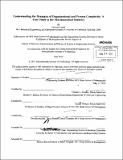| dc.contributor.advisor | Charles Cooney and Roy Welsch. | en_US |
| dc.contributor.author | Lanza, Leonora (Leonora Lina) | en_US |
| dc.contributor.other | Leaders for Global Operations Program. | en_US |
| dc.date.accessioned | 2012-09-27T15:27:48Z | |
| dc.date.available | 2012-09-27T15:27:48Z | |
| dc.date.copyright | 2012 | en_US |
| dc.date.issued | 2012 | en_US |
| dc.identifier.uri | http://hdl.handle.net/1721.1/73386 | |
| dc.description | Thesis (M.B.A.)--Massachusetts Institute of Technology, Sloan School of Management; and, (S.M.)--Massachusetts Institute of Technology, Engineering Systems Division; in conjunction with the Leaders for Global Operations Program at MIT, 2012. | en_US |
| dc.description | Cataloged from PDF version of thesis. | en_US |
| dc.description | Includes bibliographical references (p. 65). | en_US |
| dc.description.abstract | This thesis aims to show that with proper resource management, cross-functional communication, and organizational structure manufacturing and supply chain organizations can minimize the adverse impacts of organizational and process complexity and grow for the future. To do this we study at the pharmaceutical industry and Novartis Pharma Technical Operations ("TechOps"). We conduct employee interviews, benchmark across global industries, case study two representative products, and turn to the field of system dynamics to map the relationships over time. This paper will prove that the generic dynamic model of production and supply issues presented can be directly applied to the situation at TechOps and other large manufacturing companies. We will use this and our knowledge of future changes to determine the best next steps for organizational improvements. As the pharmaceutical industry evolves, TechOps has an increasing need to be more agile and flexible to the changing market environments. The Vision 2015 for TechOps is to look beyond manufacturing alone to become a world-class supply organization. In other words, TechOps not only needs to have the technical expertise they have built through their functional divisions, but also brand ownership and global optimization of product production. Through our research, we see that TechOps will not be able to achieve this goal if they do not reverse the adverse impacts of their complex supply chain through better end-to-end visibility and organizational enhancements. However, moving directly into an organization structure that is based solely on product lines would not fit strategically and culturally with the organization. Furthermore, since TechOps has always been divided along manufacturing functions, there are few resources that have the experience and insight across the various operations; TechOps needs to build these capabilities into their organization over time. Therefore, we recommend that TechOps explore the enhancement of the Supply S Chain Brand Lead role into an established owner of the end-to-end supply process for identified products, look into establishing a Manufacturing Services and Technology (MS&T) group that will own technical process changes among the functions and revise the Key Performance Indicators (KPIs) to optimize performance end-to-end, be brand focused, expose complexity and trigger proactive responses. All of these changes should be facilitated by additional communication tools and incentives. | en_US |
| dc.description.statementofresponsibility | by Leonora Lanza. | en_US |
| dc.format.extent | 65 p. | en_US |
| dc.language.iso | eng | en_US |
| dc.publisher | Massachusetts Institute of Technology | en_US |
| dc.rights | M.I.T. theses are protected by
copyright. They may be viewed from this source for any purpose, but
reproduction or distribution in any format is prohibited without written
permission. See provided URL for inquiries about permission. | en_US |
| dc.rights.uri | http://dspace.mit.edu/handle/1721.1/7582 | en_US |
| dc.subject | Sloan School of Management. | en_US |
| dc.subject | Engineering Systems Division. | en_US |
| dc.subject | Leaders for Global Operations Program. | en_US |
| dc.title | Understanding the dynamics of organizational and process complexity : a case study in the pharmaceutical industry | en_US |
| dc.type | Thesis | en_US |
| dc.description.degree | S.M. | en_US |
| dc.description.degree | M.B.A. | en_US |
| dc.contributor.department | Leaders for Global Operations Program at MIT | en_US |
| dc.contributor.department | Massachusetts Institute of Technology. Engineering Systems Division | |
| dc.contributor.department | Sloan School of Management | |
| dc.identifier.oclc | 809799602 | en_US |
